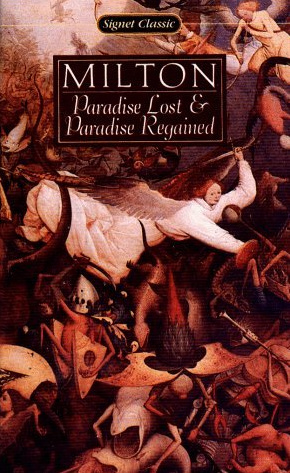

John Milton · 400 pages
Rating: (6.5K votes)
“high words, that bore Semblance of worth not substance, gently”
― John Milton, quote from Paradise Lost and Paradise Regained
“who overcomes By force, hath overcome but half his foe.”
― John Milton, quote from Paradise Lost and Paradise Regained
“Son of Heav'n and Earth,
Attend: That thou art happy, owe to God,
That thou continu'st such, owe to thyself,
That is, to thy obedience; therein stand.
This was that caution giv'n thee; be advis'd.
God made thee perfect, not immutable;
And good he made thee, but to persevere
He left it in thy power, ordain'd thy will
By nature free, not overrul'd by Fate
Inextricable, or strict necessity;
Our voluntary service he requires,
Not our necessitated, such with him
Finds no acceptance, nor can find, for how
Can hearts, not free, be tri'd whether they serve
Willing or no, who will but what they must
By Destiny, and can no other choose?
Myself and all th'Angelic Host that stand
In sight of God enthron'd, our happy state
Hold, as you yours, while our obedience holds;
On other surety none; freely we serve,
Because wee freely love, as in our will
To love or not; in this we stand or fall:
And some are fall'n, to disobedience fall'n,
And so from Heav'n to deepest Hell; O fall
From what high state of bliss into what woe!
--Archangel Raphael to Adam, Paradise Lost Book V”
― John Milton, quote from Paradise Lost and Paradise Regained
“To reign is worth ambition though in Hell: Better to reign in Hell, then serve in Heav’n.”
― John Milton, quote from Paradise Lost and Paradise Regained
“Better to reign in Hell, then serve in Heav’n.”
― John Milton, quote from Paradise Lost and Paradise Regained

“Thus with the Year Seasons return, but not to me returns Day, or the sweet approach of Ev’n or Morn, Or sight of vernal bloom, or Summers Rose, Or flocks, or herds, or human face divine; But cloud in stead, and ever-during dark Surrounds me, from the chearful waies of men Cut off, and for the book of knowledg fair Presented with a Universal blanc Of Natures works to mee expung’d and ras’d, And wisdome at one entrance quite shut out.”
― John Milton, quote from Paradise Lost and Paradise Regained
“What in me is dark Illumine, what is low raise and support; That to the highth of this great Argument I may assert th’ Eternal Providence, And justifie the wayes of God to men.”
― John Milton, quote from Paradise Lost and Paradise Regained
“لقد آمنت طوال حياتي بالسلوك المتحضر، وفي هذه المناسبة، لاأستطيع أن أنكر أن الذاكرة تتركني مشمئزا من نفسي”
― J.M. Coetzee, quote from Waiting for the Barbarians
“Büyüdükçe ve peşinden koştuğu her emeli elinden kaçırdıkça bütün şeylerin geçici olduğunu karar verdi.”
― Elif Shafak, quote from Honor
“orang-orang yang tidak tahu apa yang paling mereka inginkan, pasti tidak akan mendapatkan apa pun”
― Ryū Murakami, quote from Coin Locker Babies
“Is it not better for a man never to have been born?"
"Certaintly not" The response was brisk. "Just to be able to study the sky is reason enough to be alive."
"Unfortunately, I can't see the sky."
"Then listen to music.”
― Gore Vidal, quote from Creation
“He grew vexed and asked if poverty and hardships with freedom, were not preferable to our treatment in slavery...No, I will not stay. Let them bring me back. We don't die but once.”
― Harriet Ann Jacobs, quote from Incidents in the Life of a Slave Girl
BookQuoters is a community of passionate readers who enjoy sharing the most meaningful, memorable and interesting quotes from great books. As the world communicates more and more via texts, memes and sound bytes, short but profound quotes from books have become more relevant and important. For some of us a quote becomes a mantra, a goal or a philosophy by which we live. For all of us, quotes are a great way to remember a book and to carry with us the author’s best ideas.
We thoughtfully gather quotes from our favorite books, both classic and current, and choose the ones that are most thought-provoking. Each quote represents a book that is interesting, well written and has potential to enhance the reader’s life. We also accept submissions from our visitors and will select the quotes we feel are most appealing to the BookQuoters community.
Founded in 2023, BookQuoters has quickly become a large and vibrant community of people who share an affinity for books. Books are seen by some as a throwback to a previous world; conversely, gleaning the main ideas of a book via a quote or a quick summary is typical of the Information Age but is a habit disdained by some diehard readers. We feel that we have the best of both worlds at BookQuoters; we read books cover-to-cover but offer you some of the highlights. We hope you’ll join us.